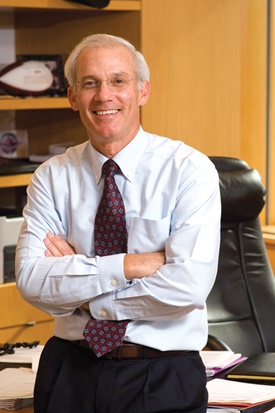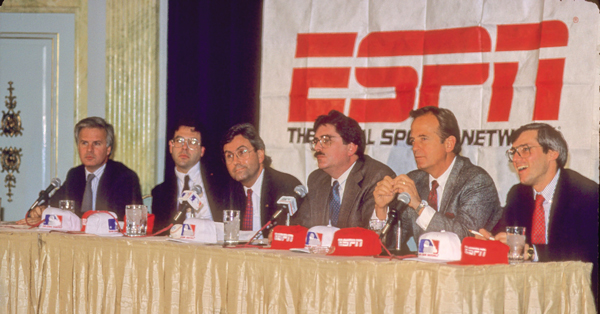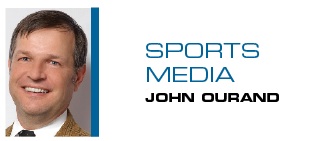E
d Durso, who is leaving ESPN at the end of the month after a 28-year career, is the most important ESPN executive who you don’t know.
A polished, behind-the-scenes player, Durso has been part of every big decision made by ESPN over the past three decades. But he has never sought credit and has shunned any sort of public profile.
For example, in the 11-plus years that I’ve been at SportsBusiness Journal, I have not quoted Durso for any story — not even once — even though I write about ESPN virtually every week, and he’s had input in just about every move ESPN has made.
“Ed was in the room for every single important decision that the company has made since he joined ESPN in 1989,” former ESPN President George Bodenheimer said. “You will rarely find a person who is so involved in every single thing a company does.”
ESPN President John Skipper echoed that sentiment, describing Durso as someone who instantly became a trusted confidant almost as soon as Skipper was named president in 2012.
“He is the last stop,” Skipper said. “You need a person who is the last stop to help decide what you want to do and make sure that you’re not making a mistake. That’s what Ed has been for me. He’s been that on our BAMTech and ACC Network deals and our Altice deal. Anything we do, we want to find out what Ed thinks about it.”
 |
Ed Durso was a trusted adviser to three ESPN presidents.
ESPN IMAGES |
Durso’s exit comes as the network has gone through three rounds of layoffs over the past two years, but there’s no backstory to Durso’s decision to leave. ESPN wants to keep him, but Durso, who is in his mid-60s, wants to escape the corporate rat race.
That rat race started in September 1989 when ESPN’s Roger Werner and Steve Bornstein hired him as general counsel. He has since been a close adviser to three presidents (Bornstein, Bodenheimer and Skipper) and offered input on countless deals, all while shunning the limelight.
Durso’s current role has him overseeing everything from public relations and facilities to the legal, security and government relations departments. Plus, he acts as a trusted adviser to ESPN’s top executives, a political lobbyist for ESPN’s interests and a leader overseeing ESPN’s charitable outreach.
“He’s the one guy I know who had no agenda, other than to help me get it right,” Skipper said. “He only cares about ESPN and getting it right. He’s known that he’s been near the end of his career. He’s not worried, thinking about his next job or what his bonus is going to be. He’s just thinking about getting it right.”
ESPN hired Durso from Major League Baseball after, as Bornstein put it, “he took my pants down in the 1989 MLB negotiation.”
Durso joined as general counsel, but his role instantly grew much broader than being a corporate lawyer, mainly because of his penchant of taking on the hardest jobs at the company.
“He reveled in trying to get into the toughest and meatiest issues the company was facing or that other people didn’t want to take on,” said NBC Sports Regional Networks President David Preschlack, who worked at ESPN from 1995 to 2015.
Preschlack described as invaluable Durso’s input on ESPN’s affiliate deals, the deals that brought ESPN the highest affiliate fees in the business by far. Before every affiliate deal, Durso would send a list of issues “that would be a mile long,” Preschlack said. Then Durso would sit in a room with Bodenheimer or Skipper, former affiliate head Sean Bratches and Preschlack, and figure out the best way to solve them. He often adopted the role of devil’s advocate, Preschlack said.
“He did that for everything,” Preschlack said. “He did that with rights negotiations and for issues with league partners. He wasn’t there just being a devil’s advocate. He was there being a problem solver.”
In his heart, Durso is a baseball guy. He played shortstop for Harvard in the early to mid-1970s, including the 1974 team that was the last Ivy League team to make the College World Series. He spent 10 years at MLB before moving over to ESPN. True to his nature, many at ESPN are unaware of his baseball prowess.
 |
Durso (far right) had a rare moment in the spotlight in 1989 when he helped announce MLB’s new media rights deal with ESPN, joined by Peter Ueberroth, Bryan Burns, Roger Werner, Steve Bornstein and John Martin.
ESPN IMAGES |
“Ed is an unassuming guy,” Skipper said. “He never tells you anything. I had to pull it out of him that he played in the College World Series against people like Dave Winfield and Fred Lynn.”
Several years ago, Durso let his unassuming nature drop, which led to a story that has become a legend in some Bristol circles.
One day in Cleveland, ESPN executives were allowed to take batting practice at Jacobs Field, now called Progressive Field. Several executives took their turns, producing a series of unimpressive dribblers and harmless pop-ups. When Durso took the bat to take his cuts, he knocked the first pitch he saw off the outfield wall.
“It is a bit of a metaphor for Ed,” Skipper said. “Ed can hit a ball off the wall even though he doesn’t look like he could.”
Durso’s baseball background helped Bodenheimer realize the executive’s importance almost as soon as he was named president in 1998. At the time, MLB sued ESPN because the network moved some “Sunday Night Baseball” games to ESPN2 to make room for a new package of “Sunday Night Football” games.
Bodenheimer leaned on Durso for help. He remembers spending countless hours with Durso in a federal judge’s chambers, followed by marathon meetings at MLB offices. MLB wound up dropping its lawsuit and signing a rights extension with ESPN.
“I had never met Bud Selig. I was starting from square one,” Bodenheimer said. “Ed’s experience and his role as general counsel was invaluable to me. It’s really a credit to Ed’s smarts, tenacity and skill.”
Skipper had known Durso for a long time before becoming president. But it wasn’t until he became president that he saw how valuable Durso was.
“I’ve known of his integrity forever,” Skipper said. “But I knew the first time I talked to him after I got the job that he was going to play this role for me because he didn’t have any other agenda.”
Chris LaPlaca, ESPN senior vice president of corporate communications, initially was wary when told that the communications department would report to Durso in the early 1990s.
“Early on, I was like, ‘Oh, no. We’re reporting to the lawyer. We’re not going to be able to say anything,’” LaPlaca said.
One of the first big issues that grabbed Durso’s attention was a personnel issue that had been in the public eye. LaPlaca says he doesn’t remember the specific issue, but he remembered that the communications staff wanted to use one approach and ESPN’s lawyers wanted to use another approach.
“Ed was a great consensus builder, but it was clear that consensus would be hard to come by,” LaPlaca said. “He came down leaning towards moving forward the way I was recommending. I laughed and said, ‘Well, maybe you’re not the lawyer guy anymore.’”
Preschlack said that Durso’s legacy will be the integrity and smarts that he brought to Bristol.
“With any issue that potentially positioned the company in a negative light, Ed never looked for the easy way out,” he said. “He’s always focused on what the right thing to do was, no matter how hard it was to do or how hard it was for the company.”
The ESPN executives interviewed for this column all talk about Durso’s good nature and dry sense of humor. Preschlack, a Chicago native and die-hard Cubs fan, has a standing $1 bet with Durso, a Red Sox fan, over which team will have a better regular-season record.
“I have never worked with anyone that has more integrity than Ed Durso,” Preschlack said. “Ed is a great dude.”
John Ourand can be reached at jourand@sportsbusinessjournal.com. Follow him on Twitter @Ourand_SBJ.






